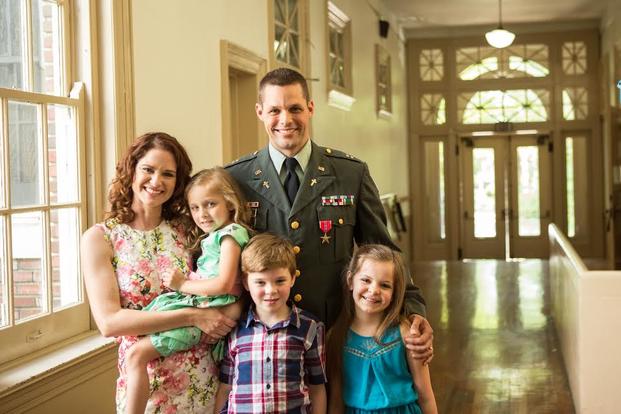"Indivisible" is an unapologetically faith-based movie that tells the story of Army Chaplain Darren Turner and what happened during and after his deployment to Iraq. It's not quite the story you might expect and raises some interesting questions for anyone who's experienced combat or has a friend or family member who did.
Darren Turner is a real guy who's still serving in the Army. He spoke with us and has some excellent insight into the difference between his actual life and way a movie tells a story. He also talks about his service and how he's addressed his own post-traumatic stress.
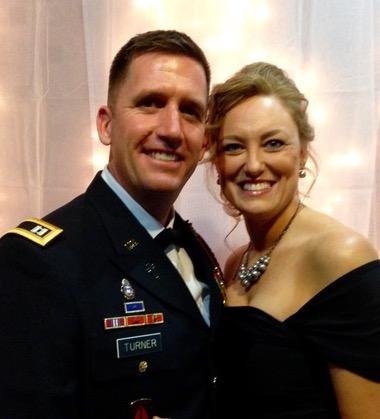
What's the process of working with the Pentagon when you're on active duty and having a film made about your life?
I have no idea, to be quite honest. The Graceworks Pictures folks did that. All we did was notify our public affairs officer and our JAG. And they looked into a little bit, but Graceworks did all of the communicating with big Army public affairs and I'm sure public affairs got the clearance from the Pentagon. That's why it took four or five years to figure this out. My wife and I had very little to do with that. Once we were able to legally sign our life rights over to the production folks, they ran with it and did all of the stuff that needed to be done.
How did Graceworks come across your story?
Our deployment was covered in a couple of newspaper articles. There was a journalist who came over and reported some of what happened during that deployment. We had a pretty rough time of it there. I also kept a blog with pictures and notes that I would write to the kids.
So Dr. David Evans from Graceworks read the articles, Googled me, he found the blog, read that, and contacted us after that and said, "Your story is really attractive, I'm a movie maker."
David and Esther Evans are the founders of Graceworks Pictures. By day, he's a professional eye doctor in Memphis, Tennessee. David had the passion for movie making on the side, but when he's making movies that is obviously his priority during that time.
Dr. Evans learned our full story. After the deployment, I came home and almost lost my marriage. I was a wreck and did not handle that homecoming well. I got out of the Army for a year, we patched things up and I went back in the Army. When David called us, we had just returned to the military. He said, "Oh, my gosh. It's not just the online articles in your blog, but now you're telling me this whole cycle of crisis and redemption."
That's when he said, "I've gotta get your life rights, I'm gonna make a film about it. I've actually wanted to make a film about an army chaplain and your story is going to be a huge part of that." He already had some of the details in mind for a movie, so he combined chunks of our story with those ideas to create "Indivisible."
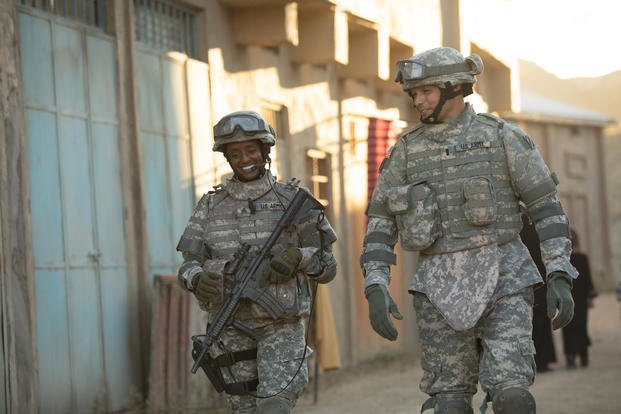
I've seen dozens of movies where people go into combat and come home, and usually that's the last five minutes of the movie. "Indivisible" is unusual because, in a way, the most important part of the film comes after your return from deployment.
A lot of war movies just show what happens in war. "Indivisible" does a great job of balancing the battles that my wife is having in her life, which are not the same battles I'm having while I'm deployed. We had three small children and she was part of the family readiness group, which takes care of spouses who are losing their husbands. She had her own drama that year as well and I think the movie shows that beautifully.
When I watch the movie, I have a new respect for what spouses really go through when they're nervous about going into the home of someone who was just notified that their husband was killed. That's an incredibly courageous moment for other Army wives to go into that scene and Indivisible does a great job of showing that, just that tension (inaudible * 0:05:54.6) outside of that door before they walk in. I have a new respect for army wives who serve in that capacity.
Was it a tough decision for you and your wife to tell the part of your story from after your return? That's not a part of the story that anybody really knew and some of it's pretty tough to watch.
As a chaplain, I have the privilege of walking the journey with lots of people who are in a tough marriage or family situation. We're not afraid to share our messiness because we do it anyway with other Army couples who seek us out for counsel. When we lead marriage retreats, we'll inject some of our own struggles into the curriculum.
And it resonates with people. When I'm supposed to have life figured out (or at least the culture says that this guy is supposed to have life figured out), it helps when they realize I'm a human and I have issues and struggles. That increases confidence in what I have to offer them because I've been there, I'm with them. I'm not just way up here, some religious dude who doesn't have struggles. I'm in the fight with them and we've been through a tough time and we've been able to recover. And so here's how we were able to recover. That's really attractive to folks who are in a tough time and don't know how to recover.
How do your kids feel about the movie?
They giggle when they see it. It's still very surreal to hear our names spoken by actors in a movie. Of course, the movie is not a biography. When the kids saw themselves up there, our youngest said, "Oh, I would never do that." And we have to explain, "It's okay, they're portraying an Army kid. They didn't necessarily try to nail exactly what you did in this moment. They're not disparaging you by saying that this or that happened."
She's funny. She's 12, so she's trying to wrap her head around all this. "But I thought this was our true story?" It's based on a true story, but the movie folks wanted to have you do this, instead of what you actually did.
I think we should start a video review channel on Military.com where you explain military movies to our readers.
Yeah, you can sharp shoot this all day, so Army folks will be able to sharp shoot this. There are a couple of scenes where, if you're really paying attention, you will recognize some of the uniform issues. I hope that doesn't detract from the arc of the story. We can get caught up in, "Oh, the uniform was jacked up in that particular scene" or whatever. Yeah, that's true. The folks who made it were not military. They did have some advisors on set, but a couple things slipped through the cracks.
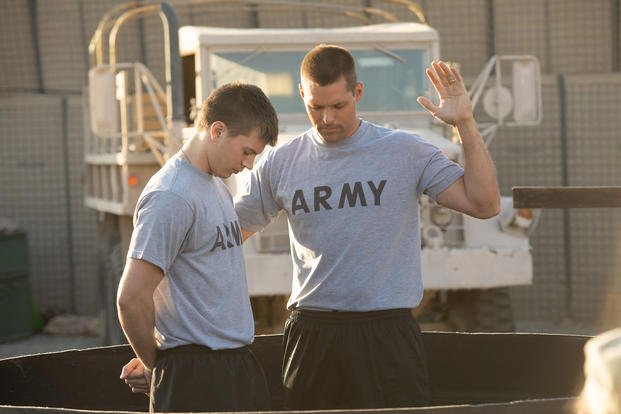
Obviously, there are a lot of people who serve in the military who don't share your particular faith or maybe don't have a faith at all. What can people who aren't necessarily Christians get out of watching the film?
"Indivisible" shows the struggles that are common to all military families. Here's what I mean by that: loss. If you've been in the military more than a minute, you've lost a buddy or a buddy of a buddy and you've gone through that. That is unique to our human condition, the grief and the pain that comes along with that. Anyone who has deployed to a combat zone, you're going to resonate with the unique stress that deployment produces. Not only just being away from your family, but getting shot at or almost dying in a situation where there's mortars coming in or just getting caught in a firefight.
There are universal themes in this movie that are external to my Christian faith, that are going to resonate with folks in a very realistic way. The director didn't want to candy-coat anything in the combat scenes or when the movie shows what my homecoming was like. This movie is real and it's raw and it's vulnerable too. It leads us to a state of "Wow, you know I need to take inventory of where I'm at with my own family situation, whether I'm married or not. Maybe I need to work some things out with my parents or my siblings or my neighbors or my friends."
At the end of the day, relationships are all we have. The Army will come and go, we're going to wear the uniform for a time, and one day we're going to take it off. What are we left with? Friends and family, the love that we have. That's universal.
Your character in the film isn't prepared for the loss before he goes into combat.
I would venture to say that no one is prepared for that level of loss. I don't know anyone who goes on a deployment prepared for mass casualties, multiple memorial ceremonies. My commander had been on many deployments by that time. I was a new chaplain and that was my first one. Those casualties had the same effect on his heart and soul as it did mine, as they did for everybody in our organization.
You can't prepare for that, but you can process it if and when it does happen in a healthier way than I did. I retreated from my family instead of running towards them. At least initially upon our homecoming, I wanted to be with the guys who I had deployed with because they were familiar. I didn't have to explain myself to them, they didn't have to explain themselves to me.
We have family members who want to know what we went through. We live in that and it's taxing and tiresome. So it's easier just to default to be with people that you're comfortable with instead of doing the hard work, which is to bring your family into the situation that you've gone through in a meaningful way.
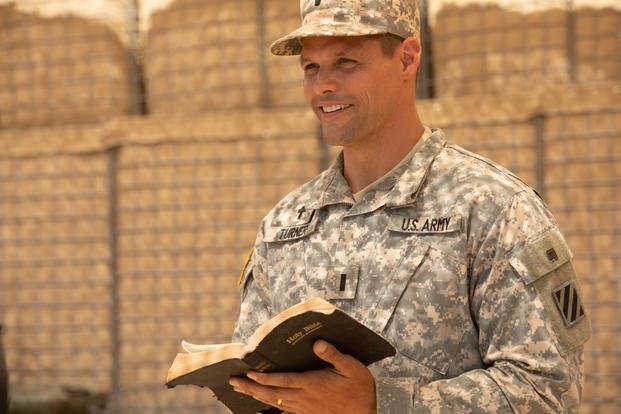
During World War II, on every street and in every town, everyone knew somebody who had suffered a loss. That's obviously not the case now. Do you have any ideas about what we can do as a country to share that burden instead of leaving it to just a very small group of people who are active in the military?
That's a great question. Almost every community across our great nation has some sort of military organization in it, whether it's a VFW or American Legion or some nonprofit organization that serves the military. That's a great place for civilians who have never served and don't plan to serve, but love the military.
If they want to get involved, go to that fish fry and just get to know some of the veterans, hear their stories, listen to them, ask them good questions. Don't just throw some money in the bucket and drive away, but sit down and share that meal with them or go to that Bingo night or whatever event is going on.
Because these men and women who have served have an incredible amount of wisdom and resources in them. If we don't tap into that, it could be a generation that is lost without our great land learning from what they've done, their sacrifice, their selfless service. They're volunteering to go to war and die for you and me, if necessary. It's an incredible privilege to talk to people who have actually signed on the dotted line in a time of voluntarly service, willingly knowing that they may have to give their life.
There are people who have served who are angry and don't want to reach out to people who don't already know what they've been through. What do you think people in the military communities can do to share those stories and make everyone else more aware of what men and women go through to serve their country?
I think they need to come to a place where they're going to have to make a choice. For those people, they've got to decide if they want to foster relationships, maybe new relationships in their life, or existing relationships. If they want to reach out, they've got to come to a place where they're willing to risk being vulnerable, they're willing to risk reaching out and listening to somebody else and not just hope that someone listens to their story. And that's a tough decision to make and I fully understand that.
That's the decision I had to come to when I saw my family falling apart. I was no longer just wanting my own wounds to heal, but I recognized that my wife and children had wounds and that I was part of the feeling in their lives as well. I had to decide to get outside of my comfort zone and engage with other people. It was going to be risky, it was painful at times, but it was worth it in the end. Like I said, one day we're going to take this uniform off and then what?
When we're in uniform, we're surrounded by like-minded people, but when we get out of the military we're suddenly no longer in that really tight community. We've got to learn ways to engage with folks in a meaningful way and listen to them and hopefully they will listen to us.
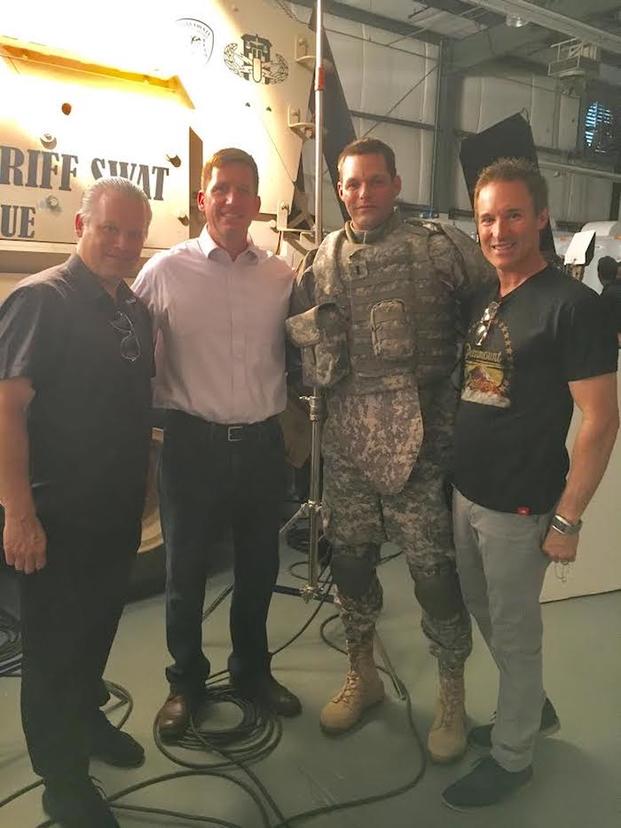
Have you had a chance to see the film with people you've served with or who you are serving with now?
No, I have not. That'll be a pretty emotional experience when that happens. I've seen it with my family and the movie director and production folks, but I have not seen it with fellow service members. I'm getting choked up even thinking about that.
Has there been a premiere yet?
There's been a red carpet event already. It was in Memphis earlier this month and we did attend that. The movie comes out this Friday, October 26th, and we just plan to show up at a random theater near our home and just be Darren and Heather Turner and not make an announcement and go see it with people who don't even know we're in the audience.
This film, ultimately, is not about us. We are representative of millions of people who have chosen to either serve in the military or be a first responder. You run to chaos. And that lifestyle has unique challenges. We are them and they are us. We are representing them. We hope that people who watch this film will have a new appreciation for military and first responders.
